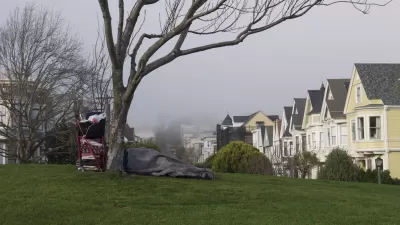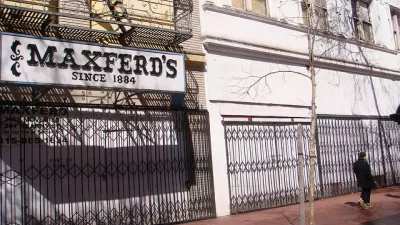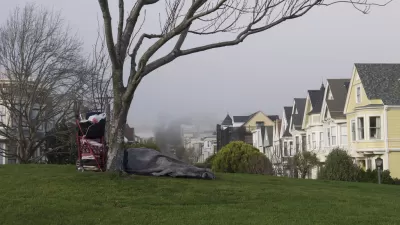San Francisco voters will decide on Proposition C, a business tax based on gross receipts levied on large employers, the most contentious of five local measures.

"Today, San Francisco’s homeless population counts 7,500 people, and the Yes On C campaign says it has a plan for most of them," reports Andy Bosselman for Curbed San Francisco.
Proposition C would fund 4,000 new permanent housing units within eight years and add 1,075 new shelter beds. It would expand mental health and substance abuse care. And to prevent people from becoming homeless, it would enlarge an existing program that helps people pay their rent.
Revenue would come from what "would be the largest tax increase in San Francisco history — $300 million annually, or a 33% increase in San Francisco’s already-high gross receipts business tax.," writes state Sen. Scott Wiener (D-San Francisco) and author of SB 827, arguably the most aggressive bill to tackle the state's housing crisis that died in April but will be reattempted next year. Wiener continues in his Medium post :
Prop C was placed on the ballot by outside groups without any meaningful stakeholder engagement or any public process, for example, without the participation of our Mayor or the leadership of the Board of Supervisors.
Jennifer Friedenbach, Executive Director of the Coalition on Homelessness, the group behind the initiative, "says they sought input from city agencies and the Chamber of Commerce," adds Bosselman.
Mayor London Breed opposes the ballot measure. Breed writes in Medium that the lack of accountability, as well as the lack of consultation, informed her decision:
The City needs to audit the $300+ million we are already spending on homelessness. My administration is at work on that now, and until the audits are done, we don’t actually know how much or what type of new homelessness funding is needed.
[See related Chronicle article: "SF way ahead of goal in registering homeless in new tracking system," Oct. 26.]
As one would expect, the business community, represented by the San Francisco Chamber of Commerce, and many technology companies, oppose Prop. C, but not all of them.
"Earlier this month, Marc Benioff, CEO of Salesforce, the city’s largest private employer, publicly voiced his support of the measure and called out Twitter CEO Jack Dorsey for his opposition, adding that many of the city’s billionaires don’t do enough to help the city’s charities in a New York Times opinion piece published [Oct. 24]," adds Bosselman. Benioff writes:
It’s also time to put to rest the claim that more generous support for the homeless will only attract more homeless people to our community. The city’s own analysis [pdf] found “no research” that expanding homeless services increases homelessness. An overwhelming majority of homeless people in San Francisco are from San Francisco.
However, Bosselman writes that although "most homeless people in San Francisco are longtime Bay Area residents, research SPUR compiled indicates that homeless people often migrate within regions, from smaller cities and suburbs to larger cities."
“What we can tell from past experience is that five years from now you’re still going to have 7,000 people out on the street,” said Jim Lazarus of the Chamber of Commerce, who also runs the No On C campaign.
Similarly, Lt. Gov. Gavin Newsom (and gubernatorial candidate) told the San Francisco Chronicle in August, “You’re not going to solve this homeless problem in San Francisco. It’s not a San Francisco issue; it’s a regional issue.”
As for SPUR, the San Francisco urban policy think tank, they endorsed the measure.
Absent federal leadership on this issue, San Franciscans have the opportunity to make significant investments in short- and long-term solutions scaled to the scope of this challenge. After weighing both sides, SPUR believes Prop. C is worthy of support.
SPUR also endorsed issuing $425 million in general obligation bonds to repair the Embarcadero seawall, Proposition A. See all five local ballot measures appearing on the San Francisco ballot on Nov. 6.
More media coverage:
-
Recode, Oct. 27: "Here’s why tech billionaires are fighting over San Francisco’s Prop C ballot measure: Leaders in the tech community are being pulled into a debate about their corporate responsibility in San Francisco and beyond."
-
CityLab, Oct. 26: "The Tech Companies Spending to Oppose (and Support) San Francisco’s Homelessness Tax."
-
San Francisco Chronicle, Oct. 21: "Prop. C on SF ballot would tap biggest businesses to raise millions for homeless."
- San Francisco Voters to Decide on Employer Tax to House the Homeless, July 18, 2018: It started in Seattle with the Amazon Tax to pay for transportation and housing needs exacerbated by the city's largest employers. Last month, a Google Tax was placed on the November ballot in Silicon Valley.
FULL STORY: Proposition C: Is it the right move for homelessness now?

Planetizen Federal Action Tracker
A weekly monitor of how Trump’s orders and actions are impacting planners and planning in America.

Maui's Vacation Rental Debate Turns Ugly
Verbal attacks, misinformation campaigns and fistfights plague a high-stakes debate to convert thousands of vacation rentals into long-term housing.

Restaurant Patios Were a Pandemic Win — Why Were They so Hard to Keep?
Social distancing requirements and changes in travel patterns prompted cities to pilot new uses for street and sidewalk space. Then it got complicated.

In California Battle of Housing vs. Environment, Housing Just Won
A new state law significantly limits the power of CEQA, an environmental review law that served as a powerful tool for blocking new development.

Boulder Eliminates Parking Minimums Citywide
Officials estimate the cost of building a single underground parking space at up to $100,000.

Orange County, Florida Adopts Largest US “Sprawl Repair” Code
The ‘Orange Code’ seeks to rectify decades of sprawl-inducing, car-oriented development.
Urban Design for Planners 1: Software Tools
This six-course series explores essential urban design concepts using open source software and equips planners with the tools they need to participate fully in the urban design process.
Planning for Universal Design
Learn the tools for implementing Universal Design in planning regulations.
Heyer Gruel & Associates PA
JM Goldson LLC
Custer County Colorado
City of Camden Redevelopment Agency
City of Astoria
Transportation Research & Education Center (TREC) at Portland State University
Jefferson Parish Government
Camden Redevelopment Agency
City of Claremont





























